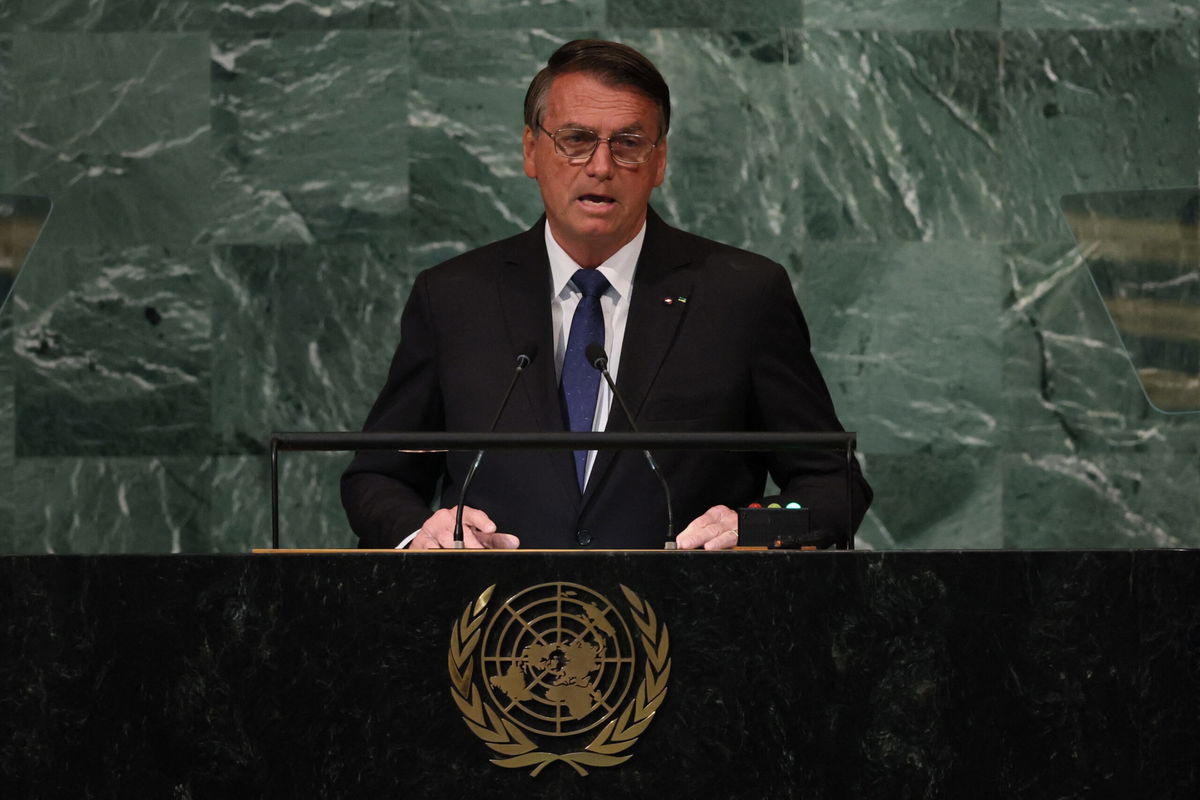Bolsonaro stumps for reelection in United Nations speech

Brazil's President Jair Bolsonaro addresses the 77th Session of the United Nations General Assembly at UN Headquarters in New York City on September 20.
By CNN’s Rodrigo Pedroso and Caitlin Hu, CNN
Brazilian President Jair Bolsonaro’s address to the United Nations General Assembly on Tuesday bore little resemblance to his past speeches before world leaders. Touting Brazil’s development under his administration and swiping at political rivals, the Brazilian leader seemed more focused on appealing to voters at home, as the country’s presidential election looms next month.
The first world leader to speak at the UN headquarters podium in New York City, Bolsonaro spent much of his speech describing economic and political achievements, saying that poverty, inflation and unemployment are decreasing in the country.
These indices have indeed all shown small decreases in the past two to three months, though the overall economic picture is somewhat starker, with one in 10 Brazilians currently unemployed and inflation at 8.73% in August, compared to the same month last year.
The President, who has long positioned himself as business-friendly, also argued that privatization and deregulation under his government have promoted a better economic environment in the country, and called for that model of governance to continue — a not-so-subtle appeal for reelection.
The right-wing Bolsonaro faces leftist former president Luiz Inacio Lula da Silva at the polls in October, and appeared to take a direct swipe at him in his speech, telling the assembled world leaders, “Between 2003 and 2015 alone, when the left ruled over Brazil, Petrobras’ indebtedness due to mismanagement, political subdivision, and deviations reached $170 billion,” he said, referring to the state petroleum company.
“The person responsible for this was unanimously convicted in three instances,” he continued, an unmistakable reference to da Silva, whose conviction was annulled by Brazil’s Supreme Court in March 2021 — clearing the way for the former leader to mount a political challenge to Bolsonaro this year.
Socially conservative themes from Bolsonaro’s election campaign also surfaced during his UN speech. “Other fundamental values for Brazilian society, reflected in the human rights agenda, are the defense of the family, the right to life from conception, self-defense and the repudiation of gender ideology,” he said.
As in previous years, the Brazilian President also pushed back against environmental concerns about Brazil’s management of the vast Amazon rainforest, telling the General Assembly that two-thirds of the entire Brazilian territory is still covered with native vegetation, “which is exactly as it was when Brazil was discovered, in 1500,” he said.
“In the Brazilian Amazon, an area equivalent to Western Europe, more than 80% of the forest remains untouched, contrary to what is publicized by the major national and international media,” Bolsonaro added.
Nevertheless, under Bolsonaro’s presidency, deforestation in the Amazon has risen to extremes, and the President himself has explicitly called for more development and economic activity that makes use of the country’s natural resources and vast protected forest.
As CNN has previously reported, between 2019 — when Bolsonaro took office — and 2021, Brazil lost over 33,800 square kilometers (13,000 square miles) of rainforest in the Amazon according to Brazil’s Space Research Institute (INPE), a government agency. That’s an area larger than Belgium, with an average of 11,000 square kilometers (4,250 square miles) lost per year.
His rival da Silva — or Lula, as he is widely known — is seen as more likely to protect the environment, recently telling CNN Brasil that in his government “there will be no Amazon deforestation.” During his presidency, which ran from 2002 to 2010, deforestation fell 65% in Brazil, according to INPE
Brazilian domestic politics are nothing new to many in New York, with pro-Bolsonaro supporters and critics seen airing their views in the streets around the UN headquarters.
The-CNN-Wire
™ & © 2022 Cable News Network, Inc., a Warner Bros. Discovery Company. All rights reserved.